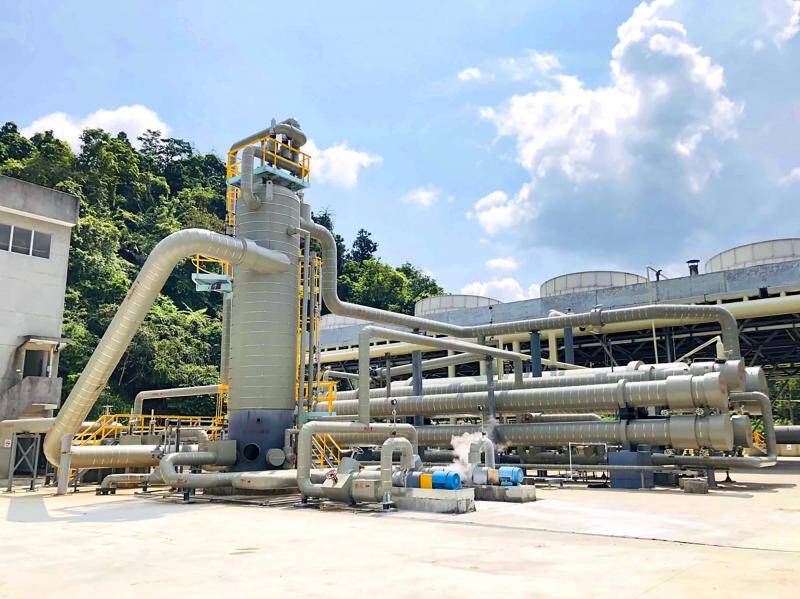The nation’s “second energy transition” would focus on geothermal energy and small hydropower, with the first geothermal exploration to start this month, Minister of Economic Affairs J.W. Kuo (郭智輝) said yesterday.
President William Lai (賴清德) on Thursday said in his Double Ten National Day address that the government would continue to promote the “second energy transition” to ensure stable power supply by developing more sources of green energy, promoting energy conservation and improving energy storage to steadily advance toward the nation’s goal of achieving net zero by 2050.
The Ministry of Economic Affairs said in a statement yesterday that it would continue to develop green energy such as geothermal power and small hydropower, in addition to more mature technologies such as photovoltaic power and offshore wind power.

Photo courtesy of Yilan County Government via CNA
A research team is to start geothermal exploration in four out of 10 selected locations, Kuo said.
The first site to be explored by the end of this month is 4,000m underground, and the experience, if successful, could be applied to the following explorations, he said in response to media queries on the sideline of a legislative meeting in Taipei.
The application of small hydropower, which means powering up engines using the vertical force of flowing water, would begin in line with the Water Resources Agency’s hydraulic engineering program starting from next year, Kuo said.
The construction of small hydropower facilities is under planning, and several hydroelectric power stations have already been built, he added.
The road map to stable power supply is complete from now to 2030, Kuo said, urging local governments and the public to support the central government’s plan to build power plants.
Asked whether nuclear energy is included in Lai’s energy transition policy, Kuo said the ministry as an executive branch would keep up with new technologies and international trends, but added that he could not speak on behalf of the president.

The Executive Yuan yesterday announced that registration for a one-time universal NT$10,000 cash handout to help people in Taiwan survive US tariffs and inflation would start on Nov. 5, with payouts available as early as Nov. 12. Who is eligible for the handout? Registered Taiwanese nationals are eligible, including those born in Taiwan before April 30 next year with a birth certificate. Non-registered nationals with residence permits, foreign permanent residents and foreign spouses of Taiwanese citizens with residence permits also qualify for the handouts. For people who meet the eligibility requirements, but passed away between yesterday and April 30 next year, surviving family members

The German city of Hamburg on Oct. 14 named a bridge “Kaohsiung-Brucke” after the Taiwanese city of Kaohsiung. The footbridge, formerly known as F566, is to the east of the Speicherstadt, the world’s largest warehouse district, and connects the Dar-es-Salaam-Platz to the Brooktorpromenade near the Port of Hamburg on the Elbe River. Timo Fischer, a Free Democratic Party member of the Hamburg-Mitte District Assembly, in May last year proposed the name change with support from members of the Social Democratic Party and the Christian Democratic Union. Kaohsiung and Hamburg in 1999 inked a sister city agreement, but despite more than a quarter-century of

Taiwanese officials are courting podcasters and influencers aligned with US President Donald Trump as they grow more worried the US leader could undermine Taiwanese interests in talks with China, people familiar with the matter said. Trump has said Taiwan would likely be on the agenda when he is expected to meet Chinese President Xi Jinping (習近平) next week in a bid to resolve persistent trade tensions. China has asked the White House to officially declare it “opposes” Taiwanese independence, Bloomberg reported last month, a concession that would mark a major diplomatic win for Beijing. President William Lai (賴清德) and his top officials

‘ONE CHINA’: A statement that Berlin decides its own China policy did not seem to sit well with Beijing, which offered only one meeting with the German official German Minister for Foreign Affairs Johann Wadephul’s trip to China has been canceled, a spokesperson for his ministry said yesterday, amid rising tensions between the two nations, including over Taiwan. Wadephul had planned to address Chinese curbs on rare earths during his visit, but his comments about Berlin deciding on the “design” of its “one China” policy ahead of the trip appear to have rankled China. Asked about Wadephul’s comments, Chinese Ministry of Foreign Affairs spokesman Guo Jiakun (郭嘉昆) said the “one China principle” has “no room for any self-definition.” In the interview published on Thursday, Wadephul said he would urge China to